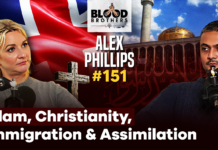A new report has revealed that British Muslims widely distrust the mainstream media and consider it a hostile force, intent on their demonisation.
The BBC, ITV, Sky News, Channel 4 as well as all the prominent British newspapers returned negative results in the survey, with only Islam Channel providing a positive one.
The revelations are contained in a sub-section of a wider report about British Muslim opinion conducted by the centre-right Policy Exchange think-tank and the pollsters ICM.
The poll canvassed more than 3,000 British Muslims and is considered one of the most comprehensive surveys of British Muslim opinion to date.
Respondents were asked to comment on how far they trusted a range of news and media organisations to give a balanced view of issues relating to Muslims.
Of nineteen different outlets traversing the realms of terrestrial and satellite television, social media and print newspapers – there was only one entity which a majority of Muslim respondents said they trusted to be fair in its coverage: Islam Channel with 52%.
It is not clear if 5Pillars or other Muslim media outlets were included in the survey.
Subscribe to our newsletter and stay updated on the latest news and updates from around the Muslim world!
By contrast, the major vehicles of mainstream media all returned negative results, with more people saying that coverage was “unfair” to some extent, than said it was “fair.”
 With the BBC, for example, only 34% of respondents considered it fair in its treatment of Muslim issues, while 58% judged it unfair to a greater or lesser extent.
With the BBC, for example, only 34% of respondents considered it fair in its treatment of Muslim issues, while 58% judged it unfair to a greater or lesser extent.
Similar or worse figures were also returned for Channel 4 (31% fair versus 56% unfair), ITV (26% fair versus 61% unfair) and Sky (23% fair and 61% unfair).
The same story emerged in regard to the mainstream print media. When asked about the fairness of their coverage, the proportion of those saying “not very” or “not at all,” ranged from 53% (the Guardian) to 59% (the Sun). Conversely, those saying that the papers were very, or partially fair in their coverage ranged from only 9% (the Sun) to 15% (the Guardian).
These perceptions of media bias were significantly different from the views recorded in the control survey of wider British opinion. There, a sizeable majority, 62% of respondents, felt that mainstream television channels such as the BBC, ITV and Channel 4 were “fair and balanced” in their coverage of Muslim issues.
Similarly, in regard to both leading satellite channels on the one hand, and the broadsheet media on the other, a large plurality of people (49%) felt their coverage was ‘fair’, whereas fewer felt it was manifestly unfair (35%).
The North East was the one region where a majority of Muslim respondents said that they trusted the BBC (69%); at the other end of the spectrum were areas such as Wales, the South West and Yorkshire and the Humber where 88%, 77% and 70% of respondents respectively said they did not trust the BBC to a greater or lesser extent.
Meanwhile, those who judged themselves less religious were more likely to say they trusted the BBC than their peers who deemed themselves particularly devout (43% as compared to 30%); similarly, those who were most observant, attending mosque at least four times a week, were more likely to say that they did not trust the BBC (64% of respondents in this category said this, as compared to 54% of those who said they never went to mosque).
In regard to Islam Channel, meanwhile, levels of trust were higher amongst elder respondents. There was also a divergence in terms of educational attainment: while those with degrees were relatively less likely to say they trusted its output (47%), current students were significantly more likely to do so (61%).
Levels of trust in Islam Channel were especially high in the East (63%), London (58%) and the South East (57%), but significantly lower in regions such as the East Midlands (43%), the North West (43%), the North East (41%), and especially in Wales, which was the one region where a clear majority of respondents said they did not trust this channel either (65% gave this answer, as compared to just 16% who said they did trust it).




















